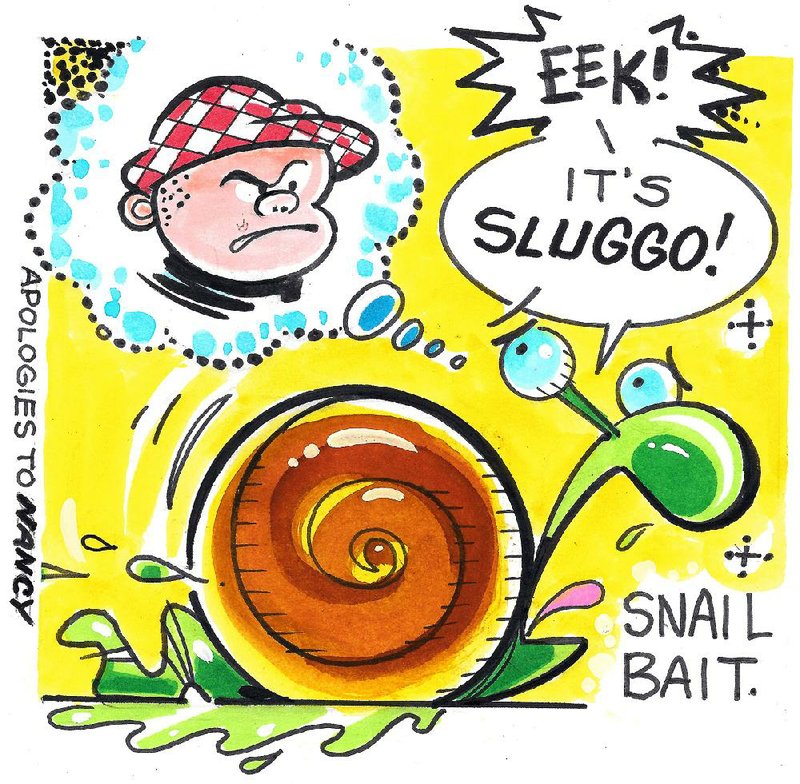Q I buy my plants at the nursery, and I guess that's where I am getting all the snails that are in my garden. Whatever, please tell me how to get rid of them. I am saturated with them in all my beds. I have used the pellets, egg shells, coffee grounds to no avail. Help!
A Snails are simply slugs with shells. Slug and snail control is the same. There are toxic baits on the market that are harmful to pets and some less toxic products like Sluggo or iron phosphate. Less toxic isn't license to start eating the stuff. As our integrated pest management specialist says: "My philosophy is ... if it is used to kill something, it is toxic and care should be used." Have you tried mulching with sweetgum balls? I have seen some trees loaded with them this year. The sharp, spiny fruits are brown; their sharpness has shown great results in keeping slugs and snails at bay. I also think you must have some really nice, shady, moist beds to be so attractive to snails.
Q I read your In the Garden weekly and love it. I live in Northwest Arkansas, Fayetteville area. I would like to plant an evergreen screen that will have western exposure. Suggestions?
A There are a number of possibilities. You could plant a single-variety hedge or a mix of evergreens, for more diversity. Choices include hollies ("Nellie R. Stevens," "Foster," "Burford" or American holly are some choices), some of the smaller Southern magnolias ("Little Gem," "Bracken's Brown Beauty" or "Teddy Bear"), and some needle-type evergreens include cryptomeria, "Green Giant" arborvitae or Eastern red cedar.
Q I went to some trouble to buy a type of Amsonia that was not hubrichtii. I can't exactly remember the name, but it might have been the "Blue Ice" variety. I have had problems with the three plants I put in just flopping over on the ground and not standing up. And they are not very vigorous. I have neighbors with beautiful plants that I believe are hubrichtii. My question is, should I just take out the plants that aren't performing as I expected and replace them with Amsonia hubrichtii? Or is something wrong with the site? They are in a garden bed with mulch and compost, so I believe they should have enough nutrients to do well.
A I believe you are referring to the larger, willow-leaf type of Amsonia, Amsonia tabernaemontana. The hubrichtii forms are the narrow or almost thread-like leaf forms. I love "Blue Ice," which is closely related to A. tabernaemontana, but is considered its own species. How much sunlight are your plants getting? If they are in more shade, they can be a bit more floppy. They do well in full sun, although a little protection from the afternoon sun won't hurt. You might try adding a perennial support to prevent the flopping, or move them to a sunnier location.
Q I took a twisted trunk tropical hibiscus into the sunroom when the weather turned cool. I have had a terrible time with aphids; over a period of time I have sprayed with Dawn dishwashing liquid and water (four times). I still saw aphids, so I stripped off all leaves and sprayed again. Did I kill it?
A I doubt you killed it by removing all the leaves, but it sure isn't happy. I would cut the plant back by half. Tropical hibiscus plants bloom on the new growth, and if you keep a plant from year to year, it needs to be repotted and cut back severely before new growth kicks in the following spring. Since it doesn't have leaves, now is the time to do so. If you allow it to start leafing out on the existing branches, it is going to be weak and leggy, and you will have fewer flowers this summer. After you cut it back, take the plant into your bathtub and run the shower over it with tepid water, making sure the water can drain freely. Then move the hibiscus into a bright, sunny location and see if it doesn't begin to leaf out. Aphids are notoriously bad swimmers, and so a nice shower, now and then, could do the trick. If you need to make your own insecticidal soap again, try one teaspoon of Murphy's Oil Soap per gallon of water.
DEAR READERS: If you know of a graduating high school senior who plans to major in horticulture or a related field, the deadline to apply for the County 76 Master Gardeners Janet B. Carson college scholarship is March 10. The application and more information can be found at tinyurl.com/carsonscholar.
Janet B. Carson is a horticulture specialist for the University of Arkansas Cooperative Extension Service. Write to her at 2301 S. University Ave., Little Rock, Ark. 72204 or email her at
HomeStyle on 02/03/2018

